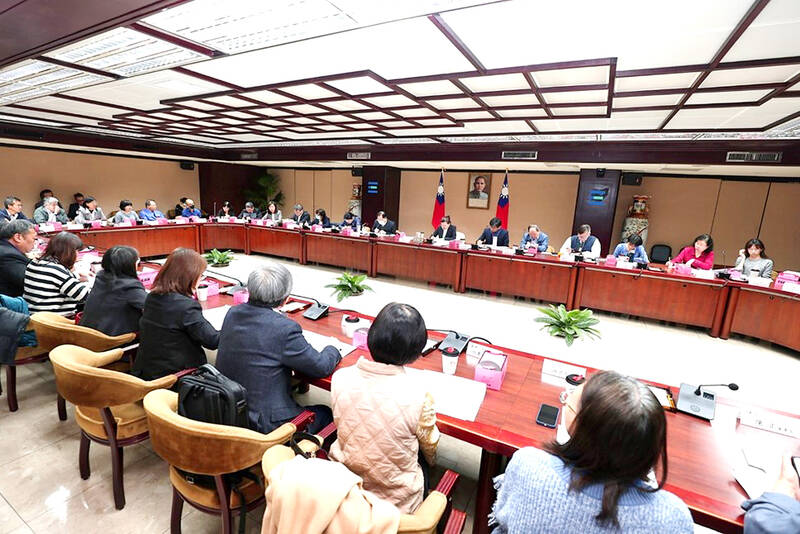The government plans to help boost the local small-molecule drug CDMO industry by cooperating with firms to jointly develop key technology platforms, the Ministry of Economic Affairs (MOEA) said yesterday.
CDMO refers to a contract development and manufacturing organization, which provides essential services to both pharmaceutical and biotech companies with lower-cost, time-saving drug research, manufacturing and testing processes.
The key technology platforms, which would have a high entry threshold, include active pharmaceutical ingredient (API) intermediates, continuous manufacturing processes as well as special delivery solutions and dosage forms for small molecules, the ministry said in a statement.

Photo courtesy of Ministry of Economic Affairs
The ministry said it would also assist firms in conducting carbon emission investigations, enhance their engagement in international markets and simplify administrative procedures to facilitate global CDMO business opportunities.
The ministry’s remarks came after it held a meeting on Wednesday with representatives from domestic API makers, pharmaceutical formulation providers and
medical associations, as well as several health and welfare officials and researchers to discuss how to promote Taiwan’s small molecule CDMO industry.
Small molecule drugs are synthesized organic compounds with low molecular weights that allow them to penetrate cells easily and target important proteins.
The production value of small molecule drugs accounts for about 70 percent of Taiwan’s total pharmaceutical output of NT$108.9 billion (US$3.5 billion), making it a key part of the nation’s pharmaceutical industry, the ministry said.
However, many local small molecule drug manufacturers are less focused on advanced technology and lack connections with international markets, the ministry said, adding that it aims to help fims upgrade and build international links.
Rising demand for small molecule drugs is expected to create business opportunities for CDMOs. A Future Market Insights report issued in November last year said that the global small molecule CDMO market is projected to be valued at about US$124.53 billion in 2034, as the market is estimated to grow at a compound annual growth rate of 5.24 percent over the next 10 years.

Nvidia Corp chief executive officer Jensen Huang (黃仁勳) on Monday introduced the company’s latest supercomputer platform, featuring six new chips made by Taiwan Semiconductor Manufacturing Co (TSMC, 台積電), saying that it is now “in full production.” “If Vera Rubin is going to be in time for this year, it must be in production by now, and so, today I can tell you that Vera Rubin is in full production,” Huang said during his keynote speech at CES in Las Vegas. The rollout of six concurrent chips for Vera Rubin — the company’s next-generation artificial intelligence (AI) computing platform — marks a strategic

REVENUE PERFORMANCE: Cloud and network products, and electronic components saw strong increases, while smart consumer electronics and computing products fell Hon Hai Precision Industry Co (鴻海精密) yesterday posted 26.51 percent quarterly growth in revenue for last quarter to NT$2.6 trillion (US$82.44 billion), the strongest on record for the period and above expectations, but the company forecast a slight revenue dip this quarter due to seasonal factors. On an annual basis, revenue last quarter grew 22.07 percent, the company said. Analysts on average estimated about NT$2.4 trillion increase. Hon Hai, which assembles servers for Nvidia Corp and iPhones for Apple Inc, is expanding its capacity in the US, adding artificial intelligence (AI) server production in Wisconsin and Texas, where it operates established campuses. This

US President Donald Trump on Friday blocked US photonics firm HieFo Corp’s US$3 million acquisition of assets in New Jersey-based aerospace and defense specialist Emcore Corp, citing national security and China-related concerns. In an order released by the White House, Trump said HieFo was “controlled by a citizen of the People’s Republic of China” and that its 2024 acquisition of Emcore’s businesses led the US president to believe that it might “take action that threatens to impair the national security of the United States.” The order did not name the person or detail Trump’s concerns. “The Transaction is hereby prohibited,”

Garment maker Makalot Industrial Co (聚陽) yesterday reported lower-than-expected fourth-quarter revenue of NT$7.93 billion (US$251.44 million), down 9.48 percent from NT$8.76 billion a year earlier. On a quarterly basis, revenue fell 10.83 percent from NT$8.89 billion, company data showed. The figure was also lower than market expectations of NT$8.05 billion, according to data compiled by Yuanta Securities Investment and Consulting Co (元大投顧), which had projected NT$8.22 billion. Makalot’s revenue this quarter would likely increase by a mid-teens percentage as the industry is entering its high season, Yuanta said. Overall, Makalot’s revenue last year totaled NT$34.43 billion, down 3.08 percent from its record NT$35.52